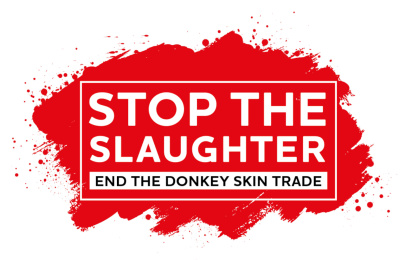You are here

The Donkey Skin Trade: Stop the Slaughter
At least 5.9 million donkey skins are needed yearly, with millions facing slaughter. The collagen from their skin produces ejiao, a traditional Chinese remedy.
China's domestic donkey population population has declined significantly. The ejiao industry now relies on a global trade network to source its donkey skin to continue meeting demand.
The donkeys caught up in this trade are suffering at every stage. The slaughter methods are often unregulated, inhumane and unsanitary, and many donkeys die on their way to slaughterhouses.

Communities who depend on their donkeys to help provide them with a livelihood wake up to find their donkeys stolen, slaughtered and skinned during the night.
Families are losing donkeys that mean so much to them. Lives and opportunities are destroyed when donkeys are removed from these communities.
The campaign against the skin trade
Our parent charity, The Donkey Sanctuary, has been campaigning to end the donkey skin trade since 2016.
Because the donkey skin trade is fast-moving and constantly adapting, The Donkey Sanctuary campaigns against it in three ways:
- Raising awareness of the crisis and bringing attention to the skin trade and the suffering of donkeys.
- Stopping the slaughter by making it harder for people involved in the trade to source, slaughter and sell donkeys and their skins. We achieve this by advocating for legislation change and law enforcement.
- Ending the skin trade by eliminating the need for donkey skins to be used in the manufacturing of ejiao, a traditional Chinese remedy made from the collagen found in donkey skins.
Join our mailing list
Stay up to date with developments in the campaign to Stop the Slaughter by signing up to our email mailing list.
Help stop the slaughter
Help us pave the way for improved donkey welfare around the world, including donkeys affected by the skin trade crisis.
What is the donkey skin trade?
The donkey skin trade is a cruel and largely unregulated international trade in donkey skins. The donkeys are often viciously slaughtered, and their skins shipped to China for the production of ejiao, a traditional Chinese remedy made from the collagen found in donkey skins.
What are the donkey skins used for?
The collagen from the donkey skins is used to create a product known as ejiao, which is then used in food, drink or beauty products.
Is the donkey skin trade legal?
The trade is illegal in some countries and legal in others. It brings cruelty and suffering wherever it operates. Where the trade operates legally, its size and complexity mean it is almost entirely unregulated, with no means of monitoring donkeys' welfare or tracking the source of individual skins. Where the slaughter of donkeys and the export of their skins is illegal, donkeys are stolen and traded indiscriminately in defiance of national and local laws. We also have evidence of links to organised criminal activity.
Do the donkeys suffer from the skin trade?
Yes. The treatment of donkeys brings intense suffering at every stage of the skin trade. From their sourcing to their eventual slaughter, the conditions are unethical, unacceptable, and often illegal.
How many donkeys are slaughtered for the skin trade each year?
The largely unregulated and often illegal nature of the donkey skin trade makes it impossible to obtain the precise number of donkey skins required to keep up with demand levels for ejiao.
In 2016, a study conducted by The University of Reading calculated that the ejiao industry required between 2.3 and 4.8 million donkey skins to keep up with demand.
In 2023, our teams reviewed the University of Reading's calculation, using updated figures reported by the ejiao industry in 2022. They found that the ejiao industry now requires a minimum of 5.9 million donkey skins to keep up with the latest demand figures.
What impacts does the skin trade have on donkey owners?
The donkey skin trade has devastating and wide-ranging economic and educational impacts that disproportionately impact women and children. Without their donkeys to help them, women and children spend more hours completing tasks, harming their economic mobility and reducing their educational opportunities.
Are there any alternatives to donkey skin for the ejiao industry?
A process known as 'cellular agriculture' may potentially remove the need for donkey skins in the production of ejiao. Cellular agriculture is a way of manufacturing products that would traditionally require harvesting from animals. Animal cells are grown and maintained under carefully controlled laboratory conditions. Animal products created using cellular agriculture do not require animals to be bred, reared or slaughtered, and they remain biologically equivalent to the products made through traditional methods.
